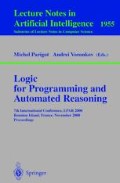Abstract
we define a generic control-flow sensitive static analysis, Static Reduction Analysis (SRA), for an untyped object-oriented language featuring side-effects and exceptions. While its aims and range of applications closely relate to Control Flow Analysis (CFA), SRA exhibits a distinguishing feature: it only deals with abstract syntax tree (AST) nodes and does not involve approximations of environments nor stores.
Access this chapter
Tax calculation will be finalised at checkout
Purchases are for personal use only
Preview
Unable to display preview. Download preview PDF.
References
O. Agesen. The cartesian product algorithm: Simple and precise typing of parametric polymorphism. In W. Oltho., editor, Proceedings of ECOOP’95, volume 952 of Lecture Notes in Computer Science, pages 2–26. Springer-Verlag, 1995. 359
G. Barthe, G. Dufay, L. Jakubiec, B. P. Serpette, S. Melo de Sousa, and S.-W. Yu. Formalisation of the Java Card Virtual Machine in Coq. In S. Drossopoulou, S. Eisenbach, B. Jacobs, G. T. Leavens, P. Müller, and A. Poetzsch-Heffter, editors, Proceedings of FTfJP’00—ECOOP Workshop on Formal Techniques for Java Programs, 2000. 360
C. Flanagan and M. Felleisen. Componential set-based analysis. In Proceedings of PLDI’97, volume 32 of ACM SIGPLAN Notices, pages 235–248. ACM Press, 1997. 346
J. Gosling, B. Joy, and G. Steele. Java Language Specification. The Java Series. Addison-Wesley, 1996. 344
D. P. Grove. Effective Interprocedural Optimization of Object-Oriented Languages. PhD thesis, University of Wahsington, 1998. 345
N. Heintze and D. McAllester. On the complexity of set-based analysis. In Proceedings of ICFP’97, pages 150-163. ACM Press, 1997. 346
S. Jagannathan and S. Weeks. A unified treatment of flow analysis in higher-order languages. In Proceedings of POPL’95, pages 393–407. ACM Press, 1995. 345
K. Leino and R. Joshi. A semantic approach to secure information flow. In J. Jeuring, editor, Proceedings of MPC’98, volume 1422 of Lecture Notes in Computer Science, pages 254–271, 1998. 345, 345
S. S. Muchnick and N. D. Jones, editors. Program Flow Analysis: Theory and Applications. Prenctice Hall, 1981. 344
F. Nielson and H. R. Nielson. Infinitary control flow analysis: a collecting semantics for closure analysis. In Proceedings of POPL’97, pages 332–345. ACM Press, 1997. 345, 360
F. Nielson, H. R. Nielson, and C. Hankin. Principles of Program Analysis. Springer-Verlag, 1999. 344
J. Palsberg and C. Pavlopoulou. From polyvariant flow information to intersection and union types. In Proceedings of POPL’98, pages 197–208. ACM Press, 1998. 360
J. Pleyvak. Optimization of Object-Oriented and Concurrent Programs. PhDthesis, University of Illinois at Urbana-Champaign, 1996. 345
B. Serpette. Approximations dévaluateurs fonctionnels. In Proceedings of WSA’92, pages 79–90, 1992. 346, 347
M. Shapiro and S. Horwitz. Fast and accurate flow-insensitive points-to analysis. In Proceedings of POPL’97, pages 1-14. ACM Press, 1997. 351
O. Shivers. Control-Flow Analysis of Higher-Order Languages. PhDthesis, School of Computer Science, Carnegie Mellon University, May 1991. Also appears as Technical Report CMU-CS-91-145. 345, 345, 346, 347
S. F. Smith and T. Wang. Polyvariant flow analysis with constrained types. In G. Smolka, editor, Proceedings of ESOP’00, volume 1782 of Lecture Notes in Computer Science, pages 382–396. Springer-Verlag, 2000. 360, 360
B. Steensgard. Points-to analysis in almost linear time. In Proceedings of POPL’96, pages 32–41. ACM Press, 1996. 351
D. Volpano and G. Smith. Language Issues in Mobile Program Security. In G. Vigna, editor, Mobile Agent Security, volume 1419 of Lecture Notes in Computer Science, pages 25–43. Springer-Verlag, 1998. 345
Author information
Authors and Affiliations
Editor information
Editors and Affiliations
Rights and permissions
Copyright information
© 2000 Springer-Verlag Berlin Heidelberg
About this paper
Cite this paper
Barthe, G., Paul Serpette, B. (2000). Static Reduction Analysis for Imperative Object Oriented Languages. In: Parigot, M., Voronkov, A. (eds) Logic for Programming and Automated Reasoning. LPAR 2000. Lecture Notes in Artificial Intelligence(), vol 1955. Springer, Berlin, Heidelberg. https://doi.org/10.1007/3-540-44404-1_22
Download citation
DOI: https://doi.org/10.1007/3-540-44404-1_22
Published:
Publisher Name: Springer, Berlin, Heidelberg
Print ISBN: 978-3-540-41285-4
Online ISBN: 978-3-540-44404-6
eBook Packages: Springer Book Archive

